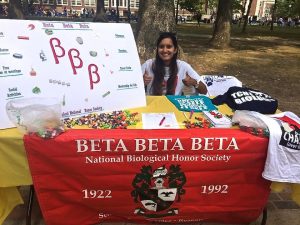 Often referred to as “Tri-Beta”, Beta Beta Beta serves as the national biological honor society and acts as both an academic and service organization for students who are passionate about the biological sciences. TCNJ’s chapter of the organization allows School of Science students and even non-science majors to join a community that celebrates and promotes the field of biology through academic discussion and dissemination, research, social events, and service.
Often referred to as “Tri-Beta”, Beta Beta Beta serves as the national biological honor society and acts as both an academic and service organization for students who are passionate about the biological sciences. TCNJ’s chapter of the organization allows School of Science students and even non-science majors to join a community that celebrates and promotes the field of biology through academic discussion and dissemination, research, social events, and service.
This past year, senior biology majors Summer Nestorowickz and Lauren McKay served as President and Vice President of TCNJ’s chapter, and both have found being part of the organization to be incredibly rewarding. According to Nestorowickz, the volunteer opportunities and academic focus are what originally attracted her to the society.
For students interested in joining the organization, there are three different levels of commitment to Tri-Beta. General Membership includes any TCNJ student who has a passion for the field of biology. Those with this type of membership are permitted to engage in all activities, but their membership will end upon graduating from the College.
At a higher level of commitment, the Associate Membership allows students to be inducted into the National Chapter of Tri-Beta in the spring. Those with Associate Membership may also participate in the organization’s social events, but like the General Membership, their affiliation with the organization terminates upon graduation.
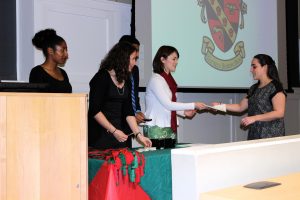 The highest level of commitment to the organization comes with Regular Membership. Regular Members are biology majors who have completed three biology courses successfully and have earned a biology GPA of at least 3.0 or higher. One of these three courses must be above the introductory-level and only one of these courses will be accepted from another institution with a grade of “B” or higher. In addition to the academic requirements, students must have attended all Tri-Beta meetings and have completed three hours of service during the year prior to induction. Regular Members are inducted into the National Chapter each spring and remain members for life.
The highest level of commitment to the organization comes with Regular Membership. Regular Members are biology majors who have completed three biology courses successfully and have earned a biology GPA of at least 3.0 or higher. One of these three courses must be above the introductory-level and only one of these courses will be accepted from another institution with a grade of “B” or higher. In addition to the academic requirements, students must have attended all Tri-Beta meetings and have completed three hours of service during the year prior to induction. Regular Members are inducted into the National Chapter each spring and remain members for life.
Holding a few meetings each month, Tri-Beta also offers students opportunities for mentorship. Seniors and juniors serve as mentors for sophomores and first-year students to increase their involvement in the Biology Department as well as assist them with their classes. For McKay, one of the most valuable aspects of her Tri-Beta experience was her relationship with her biology peer mentor.
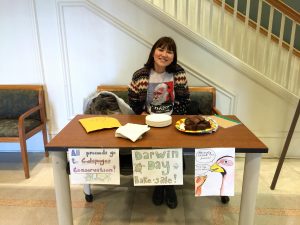 Nestorowickz adds that the organization offers valuable volunteer opportunities for students. “We have different opportunities for all aspects of biology from teaching to ecology,” she says. “No matter what field you enter, you’re going to need some sort of volunteer experience so you might as well complete it through an honors society.”
Nestorowickz adds that the organization offers valuable volunteer opportunities for students. “We have different opportunities for all aspects of biology from teaching to ecology,” she says. “No matter what field you enter, you’re going to need some sort of volunteer experience so you might as well complete it through an honors society.”
While research is central to the Biology Department, it is equally as important to Tri-Beta. The honor society promotes biological study and exploration and even hosts its own online journal, allowing students to publish their work. The organization also works closely with professors who assist students in learning more about the Biology Department and its various concentrations.
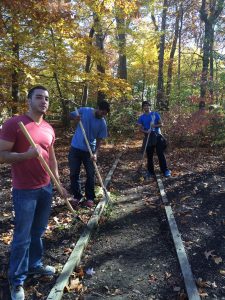 Both Nestorowickz and McKay emphasize the importance of giving back to the community, and what better way to accomplish this but through biology? In the past, Tri-Beta has volunteered in Trenton, NJ by providing tutors for adults trying to earn their GED, and over the winter break members also visited assisted living homes. In addition, Tri-Beta has participated in the ecology trail clean up run by the TCNJ Environmental Club.
Both Nestorowickz and McKay emphasize the importance of giving back to the community, and what better way to accomplish this but through biology? In the past, Tri-Beta has volunteered in Trenton, NJ by providing tutors for adults trying to earn their GED, and over the winter break members also visited assisted living homes. In addition, Tri-Beta has participated in the ecology trail clean up run by the TCNJ Environmental Club.
Another notable event organized by Tri-Beta is held in honor of one of biology’s famous thinkers, Charles Darwin. According to assistant professor of biology and Tri-Beta faculty advisor Dr. Kathryn Elliott, Darwin Day is a global event held on the scientist’s birthday. “For Tri-Beta students, this day is an opportunity to share their passion for science with the community and celebrate the fundamental role that Darwin’s contributions play in modern biology,” she says. “Last year, the students decided to weave a service aspect into their celebration. They held a bake sale with proceeds benefiting conservation in the Galapagos Islands, where the flora and fauna encountered by Darwin helped to inspire and crystallize his developing ideas on evolution.”
In addition to celebrating science heroes, the organization has also become involved with exposing younger students to the biological sciences. Tri-Beta members visited an elementary school for an event called “Hands on Science Night” where members helped kids create edible “cells and bacteria” using sprinkles.
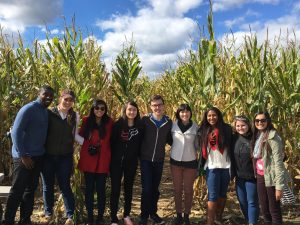 Senior biology major and Tri-Beta member Oluwafeyijimi Solako recalls one of his favorite activities with children called “Science Club”: “The children really enjoyed making ice cream and blowing up a volcano. It was fun to reach out to a local school in the area and get the chance to show them how cool science can be!”
Senior biology major and Tri-Beta member Oluwafeyijimi Solako recalls one of his favorite activities with children called “Science Club”: “The children really enjoyed making ice cream and blowing up a volcano. It was fun to reach out to a local school in the area and get the chance to show them how cool science can be!”
Members of Tri-Beta also partake in fun seasonal activities and social events as a group, which help them take a break from their rigorous schedules as students. In the fall, Tri-Beta holds apple and pumpkin picking events, and Nestorowickz looks forward to holding more activities next year. “In the spring, we’re planning to go play laser tag and possibly go white water rafting. Last year, we went ice skating, and it was so much fun. We also had a holiday party where we made decorations for a local nursing home and the biology office,” she says.
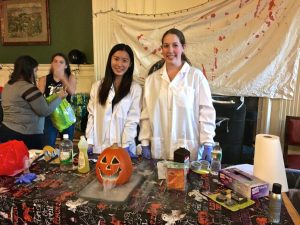 TCNJ’s chapter of Tri-Beta provides students with the opportunities to become involved in community outreach and share their passion for biology with others. Along with creating close ties between students and faculty through networking opportunities and events, students are given the chance to learn about various ways in which the field can unite and inform the community. “I find the enthusiasm and passion of the Tri-Beta members to be infectious and inspiring,” Elliott says. “Tri-Beta members are excited and intensely curious about science and biology. They are also tremendously generous students who work hard to give back to the community. Each year, I am impressed with how excited these students are to perform service and how central they are to the life of our department.”
TCNJ’s chapter of Tri-Beta provides students with the opportunities to become involved in community outreach and share their passion for biology with others. Along with creating close ties between students and faculty through networking opportunities and events, students are given the chance to learn about various ways in which the field can unite and inform the community. “I find the enthusiasm and passion of the Tri-Beta members to be infectious and inspiring,” Elliott says. “Tri-Beta members are excited and intensely curious about science and biology. They are also tremendously generous students who work hard to give back to the community. Each year, I am impressed with how excited these students are to perform service and how central they are to the life of our department.”
– Gabrielle Okun and Jordan Virgil
For More Information:
